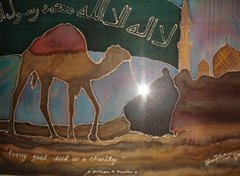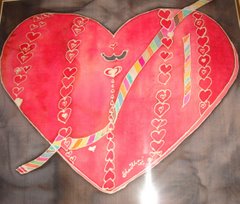
Juvriah-01/01
Juvriah bint Harith ( RA )
The Prophet (saw), said:
“Allah (swt), has commanded me to marry with the women of Paradise only.”
“I did not see any lady except Juvriah (ra), who became a source of blessing for her tribesmen because hundreds of her tribesmen were liberated from the slavery by her action”.
Juvriah bint Harith (ra), born in a Jewish chieftain’s home
Islam had begun to spread rapidly and a major portion of the Arabian Peninsula was under the influence of Islam by the year 5th after Hijrah.
The Prophet (saw), said:
“Allah (swt), has commanded me to marry with the women of Paradise only.”
“I did not see any lady except Juvriah (ra), who became a source of blessing for her tribesmen because hundreds of her tribesmen were liberated from the slavery by her action”.
Juvriah bint Harith (ra), born in a Jewish chieftain’s home
Islam had begun to spread rapidly and a major portion of the Arabian Peninsula was under the influence of Islam by the year 5th after Hijrah.
Al-Madinah had by now become the center of a stable and rapidly expanding Islamic state.
The Islamic forces were on a triumphal march, inspired by spiritual strength
The two tribes Banu Khuza’ah who were allies of the Prophet (saw), and
Banu Mustalaq, enemies of the Muslims, who planned to attack Madinah.
Juvriah bint Harith (ra), a beautiful and wealthy lady
The chieftain of this tribe was Harith bin Abi Dharar, an arrogant man who had a lot of wealth and power.He had a beautiful daughter, Juvriah (ra), who had been born just before the advent of Islam. She was brought up in the lap of luxury, and had all the refinements and graces of a princess .Intelligent and wise, she mastered language and literary style. This was an accomplishment much prized by contemporary Arabs
She was happily married to one of the rising youths of the tribe of Banu Khusa’ah, Musafa bin Safwan.
The Prophet (saw) marches to fight a battle with the Banu Mustalaq
The Muslim forces were alerted when they confirmed news, of the Banu Mustalaq preparing for war with them .An army of seven hundred Muslim forces was ready to leave, under the General, the Prophet (saw), himself ,Aishah (ra), accompanied him on this march
The Muslim forces reached Al-Marisa, a strategic point for the tribe of Banu Mustalaq and a source of water for them .The Prophet (saw), sent a message to the Banu Mustalaq to accept Islam, but they began the war instead .The Prophet (saw), ordered his troops to launch a united attack on the enemy and soon they were defeated
Juveriah bint Harith (ra), is freed and marriage to the Prophet (saw)
Her husband Musafa bin Safwan was among those who were killed in this war
Juveriah (ra), was given as a captive from the spoils of war to the famous companion Thabit bin Qais Ansari (ra), he (ra), was stunned by her beauty and kept a ransom of gold in exchange for her freedom.
Juveriah (ra), was not only beautiful, graceful, elegant and eloquent but also one who was brought up in one of the foremost families of the time.
At the first opportunity she went to the Prophet (saw), and pleaded her case with him.
The Prophet (saw), was moved by her sorrowful plea and asked her if she would like to live as a free woman and a part of his household i.e. if he paid her ransom .She (ra), was moved deeply by this unexpected elevation in her status, and was more than happy to accept his (ra), offer
She was freed, and after accepting Islam she married Prophet Muhammad (saw).
Juveriah (ra), liberates her tribe from slavery.
When the Muhaideen heard of her conversation and marriage to the Prophet (saw), they too freed all the slaves of the tribe of Banu Mustalaq
Juveriah (ra), did not only become free, but she also became a Mother of the Believers
Some time later, her father and all the men who had been freed on the occasion of her marriage went to the Prophet (saw) and accepted Islam as their religion
Juveriah (ra), was thus blessed with a twofold honor-first of freeing her countrymen from slavery and then of bringing them into the fold of Islam
Imam Baihaqi quotes Juveriah’s dream
Imam Baihaqi has quoted Juveriah (ra), as saying that, three days before the Prophet (saw), arrived she saw the moon coming towards her from the direction of
Al-Madinah and falling into her lap
She did not like to talk about it to anyone, but when they were conquered and
she was made a prisoner she hoped that her dream would be realized
When the Prophet (saw), freed her and subsequently married her, he (ra), also changed her name from Barah to Juveriah, then she was a girl of twenty (Imam Thahabi)
Aishah (ra), swa Juveriah (ra), and said that she was as beautiful as a fairy
The Prophet (saw), teaches Juveriah (ra), some beautiful sentences
Juveriah (ra), said, the Prophet (saw) told her that after leaving her in the morning he recited the above four sentences three times each and these earned him more reward from Allah than her whole morning’s prayers
The dua’a the Prophet (saw) thought Juveriah (ra)
‘How perfect Allaah is and I praise Him by the number of His creation and His pleasure, and by the weight of His throne, and the ink of His words.’ (three times)
Juveriah (ra), passes away at age sixty-five in Al-Madinah
Juveriah (ra), died at the age of sixty-five in Rabi’ul-Awwal in the year 50th after Hijrah during the caliphate of Mu’awiyah bin Abi Sufyan
The governor of Al-Madinah, Marwan bin Hakam led the funeral prayer and she was buried in Jannatul Baqi
Allah gives good news to them in
Al-Fajr 89:28-30
“O the one in (complete) rest and satisfaction! Come back to your Lord-well pleased and well pleasing. Enter you then among My (honored) servants, and enter you my Paradise.”


